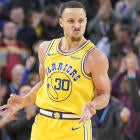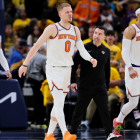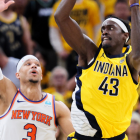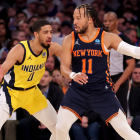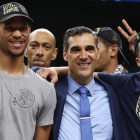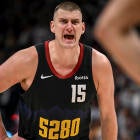When the NBA season came to an abrupt halt March 11, it pushed the pause button on Giannis Antetokounmpo's quest for a second MVP, LeBron James' pursuit of a purple-and-gold hued ring, Kawhi Leonard's attempt to stamp himself a roving one-man championship assassin, and all the other individual and team storylines left hanging by a global pandemic.
It also, for the moment, halted the era of the shooter, one ushered in when Stephen Curry and the Golden State Warriors turned the you-can't-win-titles-shooting-3s certainty into the distinct opposite.
Before the Warriors' ascendance, the NBA was played one way. After, you had to deal with and try to build a team capable of shooting the lights out of the gym.
That's why Tuesday here at CBS Sports we're going to unveil the 15 greatest shooters of all time, ranked 1-15. One sharpshooter after another, each a stepping stone in an evolution of the game that has made the traditional center obsolete and the game a vastly different thing than it was even a decade ago.
Curry, of course, is the front man for this movement, and a name you'll surely see at the top of that list. Same for his co-star Klay Thompson. But it's Curry -- with a proficiency in 3-point shooting and space creation that rewrote how basketball is played -- who's the touchstone to this time in the game.
Each era has its own face, its own star, a player who dominates not just in games but in how the game is played and perceived.
Before Larry Bird and Magic Johnson arrived, the big man prevailed. Kareem Abdul-Jabbar, Wilt Chamberlain, Bill Russell and Karl Malone defined the era of the center. The idea that championship glory required a big man was so certain that some of those big men scoffed at the idea a guard like Michael Jordan could ever be a true difference-maker when he was drafted in 1984.
Bird and Magic ushered in the modern era, and Jordan ushered in his own: A one-man show that defined basketball and all it meant around an individual star, around being Like Mike, not Like Some Big Man. The shooting guards like Kobe Bryant and one-man wrecking crews like Allen Iverson who followed were his natural heirs. When LeBron arrived, he was his own unique thing, but a shooter he was not.
The arrival of Curry as an MVP, a 3-point setting machine, and all that it meant changed everything. Beyond just his proficiency draining shots -- and that proficiency is historically great -- was his ability to exert gravity on the game itself, to push players this way and that defensively, and to redefine the math and mayhem behind a well-oiled 3-point shooting machine.
Let's not forget, as just one example, Mike D'Antoni. He twice failed -- in America's biggest markets (New York and Los Angeles), no less -- in part because his style of play was judged indulgent. Carmelo Anthony loved those elbow jumpers, Lakers brass wanted Dwight Howard and Pau Gasol out there together and D'Antoni became a laughing stock, a genius who couldn't function in the real world.
Turned out he was just ahead of his time, and still in search of the instrument of his opus in James Harden.
Curry showed the basketball world a new reality. The Splash Brothers could be champions, and the idea of Harden throwing up 20 3s in a game became not just plausible but preferred.
Curry forced the game to change, from the Charles Barkleys who believed you couldn't win trying to hit 3-point shots to those players who had to literally change the way they played to keep up.
Take Brook Lopez as the example that tells the new rule. He began as a rising star and center with the Nets who was highly coveted and handsomely paid, and in his first eight successful and highly regarded years in The Association he took exactly 31 3-pointers, 10 of them in that eighth season. He made three.
But the game changed, and he changed with it. Last year for the Milwaukee Bucks, he shot 512 3-pointers, making 36.5 percent of them. Blake Griffin is another example. The former No. 1 overall pick spent the first six years jumping over cars, making All-Star Games and shooting 0.4 3s per game. Today, he averages more than six 3-point shots a game.
Curry is the face of this change, the free-wheeling wunderkind of a shooter who is the culmination of this shift. But others -- some stars, some role players -- came before him, step by step, shot by shot, laying the groundwork for the day when a sharpshooting NBA player would be more than the consequence of double-teaming some big man, more than a guy in the corner waiting his occasional turn.
Today, the shooters are the game-changers themselves, or else the game-changers (like Giannis) make sure they learn to shoot.
And tomorrow, we'll honor the greatest of those shooters to ever play the game.













